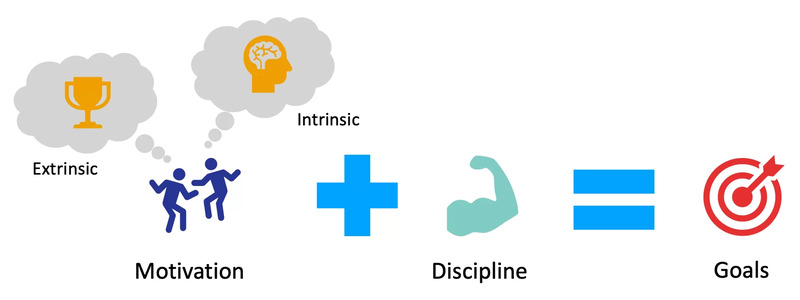
Have you ever got a whole list of plans, resolutions, feeling fully energized and ready to conquer them all but ended up giving up just after 2,3 or even 1 day? How about waking up every morning but have no clue what should be done and sit there wondering what is going wrong in your life?
It is not uncommon to see these situations nowadays, especially in young people or even adults themselves. A sudden driving force may appear to boost our confidence, making us feel like nothing is impossible but in the end the momentum can not last and things begin to fall apart. To break free from such a cycle, it is of paramount importance to have a deep understanding of motivation and discipline. Furthermore, by cultivating a strong sense of motivation and discipline, it allows UEH students to develop the full potential, transcend the barriers to become a responsible global citizen. Now, let’s delve into exploring motivation and discipline as well as the correlation between them.
Understanding the meaning of motivation:
According to the APA Dictionary of Psychology, motivation is defined as “the impetus that gives purpose or direction to behavior and operates in humans at a conscious or unconscious level”. In a simpler sense, motivation is a driving force behind our actions and behaviors, guiding us towards our goals and achieving success.
Psychologists also divide motivation into two categories: intrinsic and extrinsic motivation.

Source: Explore Psychology
Intrinsic motivation means that we are working towards a goal because it is our personal desire. Such activities need not bring tremendous rewards but throughout the process, it gives us a sense of satisfaction and fulfillment. Examples of intrinsic motivation include learning a musical instrument because individuals feel a sense of pleasure in the soul or people doing workouts for personal well being.
On the other hand, extrinsic motivation refers to a tendency to pursue an action for fear of punishment or to earn reward. Although the experience throughout the activities are not rewarding, we proceed to do it in expectation for something in return or to avoid punishments. For instance, pursuing a major to fulfill the needs and expectations of your parents or working extra hours in order to earn bonuses.
Depending on the context or on the nature of the tasks or goals, each of the motivations would act differently and develop its own strengths. While intrinsic motivation paves the way for sustainable long-term goals, extrinsic motivation often acts as encouragement and reinforcement.
However, it is believed that motivation is often fleeting and not reliable. It only exists in a short period of time and will likely diminish when challenges come. Motivation itself can not be guaranteed to appear everyday. At some point, you may find that motivation doesn’t help you get out of bed, to continue doing your work, hence, it is quite challenging to rely solely on motivation to achieve long-term results. This is when discipline comes in.
Understand the meaning of discipline:

Source: Collegenp
After motivation has provided the fuel or energy for the “machine”, it is now the discipline’s part to take over to see whether it can run smoothly and resiliently or not. Discipline is the ability to have a sense of self control even with the absence of external motivations. Unlike motivation, which is unstable at some points, discipline helps individuals be consistent with certain activities.
Discipline takes a sheer power of will, an ability to avoid all of the temptations and even make yourself follow a set of strict rules. While the nature of discipline is sometimes considered to be “dull”, the stronger your commitment, the more likely it will help you retain a more organized lifestyle, leading to long-term success.
The most powerful feature of self-discipline is the ability to help form a habit that aligns with your goals to achieve the highest outcome. As we have all experienced, whenever we try to form a new habit, we often find ourselves struggling to keep up with the progress. This can be explained by the fact that our brains are resistant to changes and tend to prefer things that are familiar. Therefore, the main purpose of forming a habit is to make the difficult tasks seem less frustrating and become the ones that are automatic like brushing teeth, taking a bath on a daily basis. Of course, easier said than done. From being motivated to form a habit by committing to self-discipline can be a long and arduous process.
The Interconnection
It is quite impossible to determine which one is more important; however, instead of comparing the importance of both motivation and discipline, it is better to recognize the intertwined relationship between them in achieving long-term results. Finding ways to mitigate the weaknesses and leverage the strengths of motivation and discipline can lead to a more effective and resilient journey.
With that being said, it is essential to have a holistic and suitable approach to embrace the synergy of motivation and discipline. Self-discipline can act as the key element that keeps the momentum flow during the time of lacking motivation. Conversely, a disciplined routine can sometimes lead to burnout; thus, this is when motivation injection is needed to refuel the engine. With the combination of these elements, not only can you be consistent with certain goals, it is also possible to find enjoyment in doing so. It was the extrinsic motivation that started everything but whether the flow can sustain or not depends mostly on our intrinsic motivation and self-discipline.
In exploring the close relationship of motivation and discipline, learning a new language is considered to be an exemplary illustration. Factors such as personal interest in culture, communication skills improvement or specific goals such as for traveling purposes or seeking job opportunities play a vital role in shaping people’s desires to learn a new language . While the initial inspiration helps set the first step, it is our commitment to a well-disciplined manner and organized studying plans that guarantees a long-lasting journey. Having a well-structured studying curriculum in combination with enjoyable activities like watching movies, listening to music is essential to make the studying process more engaging and prevent yourself from burning out. Apart from that, treating yourself with a small reward after reaching learning milestones or sharing studying progress with other learners can be an effective way to recharge your energy.

Source: Second Nature
Motivation and discipline are undeniably important and indispensable in the journey of seeking for success. Depending on the preferences and abilities of each individual, the emphasis of one over another may vary; hence, it is unrealistic to implement others’ lifestyle to ours. It is not impossible to maintain self-discipline while sparing time to fully embrace and enjoy life!
For the UEH students and those who are pursuing an academic journey or seeking personal growth, the first and most important thing is that we should be able to understand the conditions, abilities of ourselves, knowing which approach would be the best fit. At this phase, allow yourself to explore and experiment without fears; time and effort are required in discovering the right path. Furthermore, setting realistic goals is also essential to avoid frustration and demotivation. In order to stay committed throughout the journey, it includes the appropriate use of motivation and discipline. While external factors such as social media, influencers can inspire us to do things, it is our mission to define our own path. Balancing the elements of motivation and discipline is a way to make the journey more meaningful and fulfilling. In the end, it is you versus you in the battle of self-improvement and personal growth.
Lunar New Year Holiday is coming around the corner, why not involve yourself in some challenges such as 31 Medium Challenge, 75 Hard Challenge, etc. to kick start your year with full energy? These challenges require your daily commitment to a set of certain tasks to build up your habit through exercise, healthy eating, and mindfulness. Not only is it beneficial for our physical health, it plays a vital role in enhancing your capability to overcome difficulties. Throughout the process, it is possible to acknowledge the synergy between motivation and discipline; hence, allowing ourselves to make necessary adjustments to balance the two elements.
Finding ways to succeed undoubtedly takes a considerable investment of time and dedication. Through a deeper understanding of motivation and discipline provided in the article, UEH hopes it is contributing to the reader’s process of achieving success and becoming a global citizen.
News, photos: Department of Student Affairs (DSA)
Reference:
